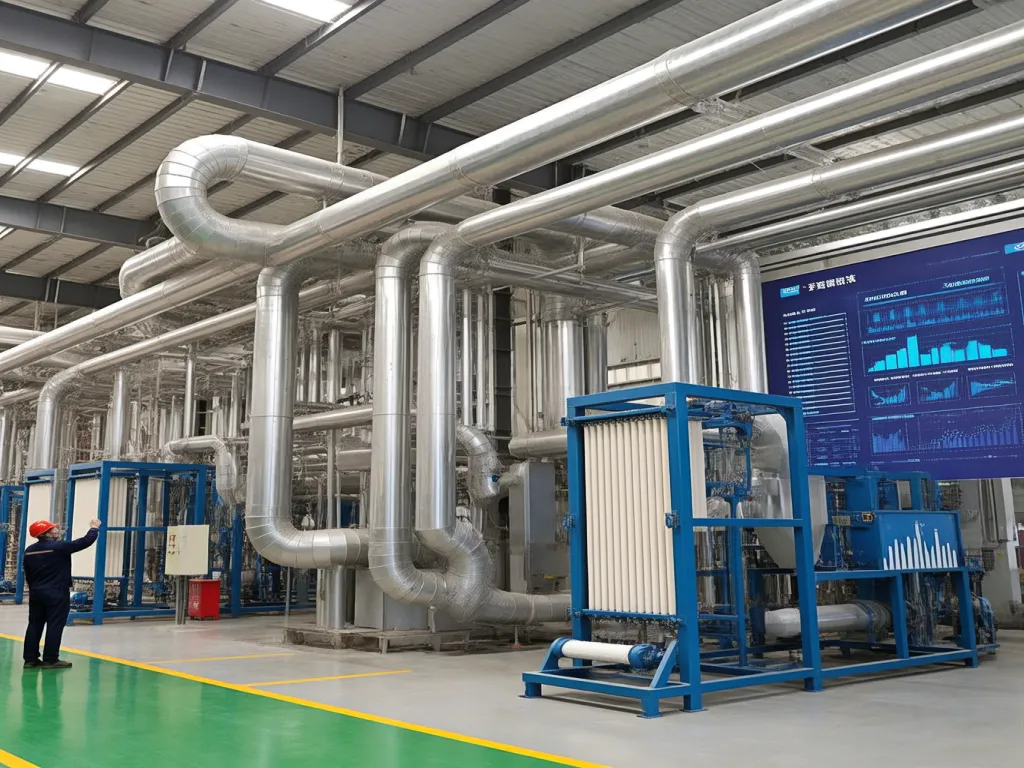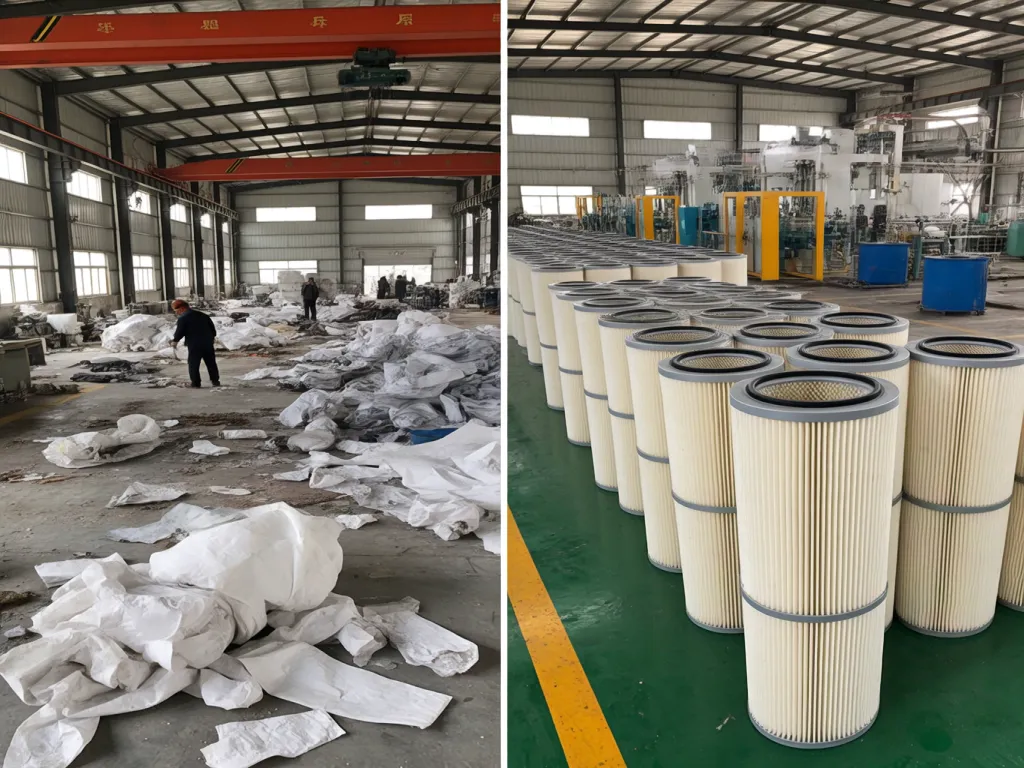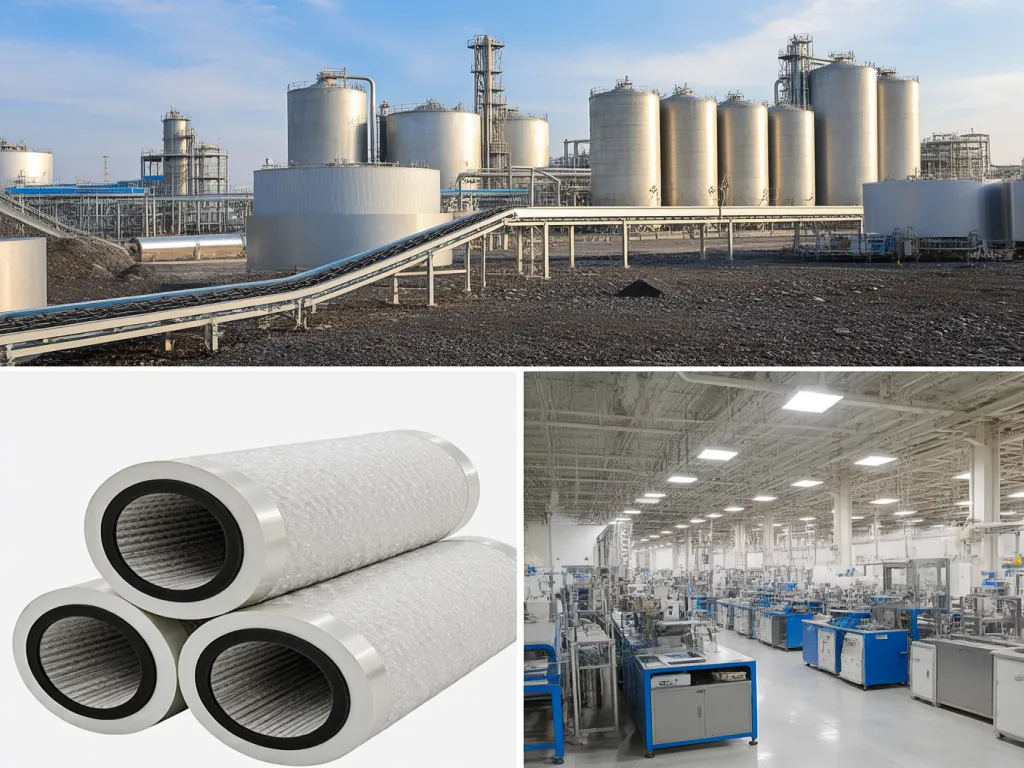Durable Felt Filters: Industrial Separation’s Best Bet

In industrial separation, the durability of filter materials can make or break operational efficiency. Have you ever faced unexpected downtime due to filter failures? Choosing the right felt filter material for industrial separation is crucial for maintaining seamless production. In this blog, we’ll uncover why durability matters and how to pick the best felt filter for your needs.

The Critical Role of Durability in Industrial Separation: Reducing Replacement Frequency and Downtime
When it comes to industrial separation, durability isn’t just a nice-to-have feature; it’s the backbone of efficient, cost-effective operations. Imagine this: you’re managing a high-volume production line where every minute of downtime translates into lost revenue and frustrated customers. Now, picture a scenario where your felt filter material for industrial separation is wearing out faster than expected, forcing you into frequent replacements. Not ideal, right? Let’s dive deeper into why durability matters so much in this context.
First off, reducing replacement frequency is a game-changer. High-quality, durable felt filter materials can withstand the rigors of industrial environments, from abrasive particles to chemical exposure, without degrading quickly. This means fewer interruptions for filter changes, allowing your production line to keep humming along smoothly. Think about the time and labor costs saved—no more constant monitoring for signs of wear or rushing to find replacements at the last minute. Instead, you can focus on optimizing other aspects of your operation, secure in the knowledge that your filtration system is robust and reliable.
But the benefits don’t stop there. Lower replacement frequency also means less waste, both in terms of materials and the environmental impact of disposing of used filters. In an era where sustainability is increasingly important, choosing durable felt filter materials aligns with eco-friendly practices, enhancing your company’s reputation as a responsible industry player.
Now, let’s talk about downtime. In industrial settings, even a short period of inactivity can ripple through the entire supply chain, causing delays and increasing costs. Durable felt filter materials significantly reduce the risk of unexpected failures that lead to production halts. By investing in filters that last longer, you’re essentially buying peace of mind—and a lot more operational uptime. This reliability is crucial for meeting tight deadlines and maintaining customer satisfaction, especially in industries where just-in-time delivery is the norm.
Moreover, the cost savings from reduced downtime are substantial. Every hour your production line is down could mean thousands of dollars in lost output, not to mention the potential for damage to equipment if the filtration system fails catastrophically. By choosing durable felt filter materials, you’re mitigating these risks, ensuring that your operations run smoothly and efficiently, day in and day out.
So, how do you ensure you’re picking the right durable felt filter material for your industrial separation needs? It starts with understanding the specific demands of your application. Are you dealing with high temperatures, corrosive chemicals, or abrasive particles? Each of these factors will influence the type of filter material that offers the best durability and performance. By conducting a thorough assessment of your operational environment, you can make an informed decision that maximizes the lifespan of your filters and minimizes the need for replacements.
In essence, durability in felt filter materials for industrial separation is about more than just saving money—it’s about creating a more resilient, efficient, and sustainable operation. It’s about ensuring that your production line can withstand the challenges of the industrial world, keeping you ahead of the competition and delivering value to your customers consistently.
Reducing Replacement Frequency: A Closer Look
One of the most immediate benefits of durable felt filter materials is the reduction in replacement frequency. In industrial settings, filters are subjected to constant wear and tear, from the abrasive action of particles to the chemical attack of corrosive substances. A filter that degrades quickly not only increases operational costs but also introduces variability into the production process, as workers must frequently pause to replace filters. Durable filters, on the other hand, maintain their integrity over longer periods, reducing the need for frequent changes and ensuring consistent performance.
Minimizing Downtime: The Hidden Cost Saver
Downtime is the enemy of efficiency in industrial operations. Every minute a production line is idle costs money, not just in terms of lost output but also in the potential for equipment damage if the filtration system fails. Durable felt filter materials play a crucial role in minimizing downtime by providing reliable, long-lasting performance. By investing in filters that can withstand the demands of your specific industrial environment, you’re reducing the risk of unexpected failures and the associated costs of production halts.
Sustainability and Cost Efficiency: A Win-Win
Choosing durable felt filter materials isn’t just good for your bottom line; it’s also a step towards sustainability. By reducing the frequency of filter replacements, you’re cutting down on waste and the environmental impact of disposing of used filters. This aligns with growing consumer and regulatory pressures for eco-friendly practices, enhancing your company’s reputation as a responsible industry leader. Moreover, the cost savings from reduced downtime and fewer replacements can be reinvested into other areas of your business, driving further growth and innovation.

Key Indicators for Assessing Durability of Felt Filter Material in Industrial Separation
When it comes to selecting felt filter material for industrial separation, durability isn’t just a nice-to-have feature—it’s a necessity. But how do you measure durability? What makes one felt filter material outlast another in harsh industrial environments? Let’s dive into the key indicators that define the longevity of felt filter materials, ensuring your industrial separation processes run smoothly without frequent interruptions.
Fiber Strength
First up, fiber strength. Imagine your felt filter material as a team of tiny warriors, each fiber a soldier. The stronger these soldiers are, the more resilient your filter will be against the onslaught of particles, chemicals, and mechanical stress. Fiber strength is typically measured in terms of tensile strength, which indicates how much force a fiber can withstand before breaking. High tensile strength means fewer fiber breakages, leading to a longer-lasting filter. But don’t just take the manufacturer’s word for it. Look for independent test reports or certifications that verify the tensile strength of the felt filter material you’re considering.
Wear Resistance
Next, we have wear resistance. In industrial settings, filters are subjected to constant friction and abrasion. Whether it’s from the particles being filtered or the mechanical action of the filtration system itself, wear and tear are inevitable. However, not all felt filter materials wear out at the same rate. High-wear-resistance felt filters are designed to withstand this friction, maintaining their structural integrity and filtration efficiency over time. To assess wear resistance, consider conducting or reviewing wear tests that simulate real-world conditions. These tests can provide valuable insights into how the filter material will perform under continuous use.
Anti-Aging Performance
Another crucial indicator is anti-aging performance. Just like any other material exposed to the elements, felt filter materials can degrade over time due to factors like UV exposure, chemical reactions, and temperature fluctuations. Anti-aging performance refers to the material’s ability to resist these degrading effects, maintaining its physical and chemical properties throughout its lifespan. To evaluate anti-aging performance, look for materials that have been treated with anti-aging agents or have inherent resistance to aging. Additionally, consider the operating environment of your industrial separation system. If your filters are exposed to extreme temperatures or harsh chemicals, you’ll want a material with exceptional anti-aging capabilities.
Construction Quality
But durability isn’t just about the material itself; it’s also about how it’s constructed. The weaving or felting process used to create the filter material can significantly impact its durability. A well-constructed felt filter will have fewer weak points, reducing the likelihood of premature failure. When evaluating felt filter materials, don’t overlook the importance of construction quality. Ask for samples or view product specifications to get a sense of how the material is made.
Lifespan Analysis
Finally, let’s talk about lifespan analysis. While all the above indicators are crucial, understanding the expected lifespan of a felt filter material in your specific industrial separation application is invaluable. Lifespan analysis involves considering factors like the type of particles being filtered, the flow rate of the system, and the operating environment. By conducting a thorough lifespan analysis, you can select a felt filter material that not only meets your durability requirements but also offers the best value for money over its lifespan. So, how do you put all this together to make an informed decision? Start by identifying your specific industrial separation needs. What are the particles you’re filtering? What are the operating conditions? Once you have a clear picture, use the key indicators we’ve discussed—fiber strength, wear resistance, anti-aging performance, construction quality, and lifespan analysis—to evaluate different felt filter materials. Remember, durability isn’t just about the initial cost; it’s about the total cost of ownership over the filter’s lifespan. Investing in a high-quality, durable felt filter material may cost more upfront, but it can save you significant money in the long run by reducing downtime, maintenance costs, and replacement frequency.
In conclusion, assessing the durability of felt filter material for industrial separation requires a comprehensive approach. By focusing on key indicators like fiber strength, wear resistance, anti-aging performance, construction quality, and lifespan analysis, you can select a filter material that not only meets your current needs but also offers long-term reliability and cost-effectiveness. So, the next time you’re in the market for felt filter material, remember these indicators and make a choice that will keep your industrial separation processes running smoothly for years to come.

Case Studies: Durable Felt Filter Material in Action Across Industries
When it comes to industrial separation, durability isn’t just a nice-to-have—it’s a must-have. Let’s dive into some real-world examples where high-durability felt filter materials have made a significant impact across different industrial sectors. You’ll see how these filters not only enhance operational efficiency but also deliver substantial economic benefits.
First up, let’s talk about the mining industry. In a large-scale copper mine, traditional filters were failing every three months due to the abrasive nature of the ore. This led to frequent downtime, increased labor costs for replacements, and lost production time. Enter a high-wear-resistance felt filter designed specifically for abrasive environments. After switching, the mine reported a filter lifespan extending to over 18 months. That’s a sixfold increase! The economic impact? A staggering 70% reduction in annual filter replacement costs and a 15% boost in overall operational efficiency due to minimized downtime. Now, isn’t that a game-changer?
Moving on to the chemical processing sector, where filters are exposed to corrosive substances. A petrochemical plant was struggling with filters that couldn’t withstand the harsh chemicals, leading to premature failures every four to six weeks. The solution? A specialized felt filter with superior anti-corrosion properties. Post-implementation, the plant saw filter lifespans jump to 12 months. The economic benefits were twofold: a 65% reduction in filter procurement costs and a significant decrease in hazardous waste disposal expenses, as fewer filters meant less waste. Plus, the improved reliability led to smoother operations and higher customer satisfaction due to consistent product quality.
Let’s not forget the food and beverage industry, where hygiene and durability go hand in hand. A large dairy processing plant was facing issues with filters clogging and degrading quickly due to the sticky, fatty residues in milk processing. The plant switched to a felt filter material engineered for high-fat environments, featuring enhanced anti-clogging properties and easy-clean surfaces. The result? Filter lifespans doubled from six to twelve months. Economically, this translated to a 50% reduction in filter costs and a 20% decrease in cleaning and maintenance labor. Moreover, the improved filter performance led to better product purity, enhancing the plant’s reputation for quality.
In the pharmaceutical industry, where precision and reliability are paramount, a drug manufacturing facility was using standard filters that couldn’t maintain the required particle retention levels over time. This led to inconsistent product quality and frequent batch rejections. By adopting a long-life felt filter with precise pore size control and excellent structural integrity, the facility achieved consistent filtration performance throughout the filter’s lifespan. The economic impact was profound: a 40% reduction in filter-related quality control issues, a 25% decrease in waste due to rejected batches, and an overall increase in production efficiency by 18%.
These case studies clearly demonstrate that investing in durable felt filter materials for industrial separation isn’t just about buying a product—it’s about making a strategic decision that pays off in the long run. Whether it’s reducing downtime, lowering costs, improving product quality, or enhancing operational efficiency, the benefits are tangible and significant. So, the next time you’re evaluating filter options, ask yourself: Can I afford not to choose durability?
Mining Industry: Tackling Abrasion Head-On
In the mining sector, abrasion is a constant challenge. Traditional filters often succumb to the wear and tear caused by coarse ore particles, leading to frequent replacements and operational disruptions. The introduction of high-wear-resistance felt filters has revolutionized this scenario. By withstanding the abrasive forces, these filters extend their service life dramatically, reducing the frequency of replacements and, consequently, the associated costs. The economic benefits are clear: lower procurement expenses, reduced labor costs for filter changes, and minimized production losses due to downtime. It’s a win-win situation for mining operations looking to optimize their filtration processes.
Chemical Processing: Corrosion Resistance Pays Off
Chemical processing plants deal with a variety of corrosive substances that can quickly degrade standard filters. The use of anti-corrosion felt filters has proven to be a cost-effective solution. These filters resist chemical attacks, maintaining their structural integrity and filtration efficiency over extended periods. The result is fewer filter replacements, lower waste generation, and reduced disposal costs. Additionally, the improved reliability of these filters ensures consistent product quality, enhancing the plant’s competitiveness in the market. For chemical processors, investing in corrosion-resistant felt filters is a smart move that delivers both operational and economic advantages.
Food and Beverage: Hygiene Meets Durability
In the food and beverage industry, maintaining hygiene standards is crucial. Filters used in this sector must not only be effective but also durable enough to withstand the rigors of daily use without compromising product quality. Anti-clogging felt filters with easy-clean surfaces have emerged as a preferred choice. These filters resist clogging from sticky residues, ensuring consistent flow rates and filtration performance. The extended lifespan of these filters reduces the frequency of replacements, lowering procurement and maintenance costs. Moreover, the improved filter performance contributes to better product purity, meeting the stringent quality requirements of the food and beverage industry.
Pharmaceutical Industry: Precision and Reliability
The pharmaceutical industry demands filters that can maintain precise particle retention levels over time. Standard filters often fall short in this regard, leading to inconsistent product quality and frequent batch rejections. Long-life felt filters with precise pore size control and excellent structural integrity have addressed this challenge. These filters ensure consistent filtration performance throughout their lifespan, reducing quality control issues and waste due to rejected batches. The economic benefits include lower filter-related costs, improved production efficiency, and enhanced product quality. For pharmaceutical manufacturers, choosing durable felt filters is a strategic decision that supports their commitment to delivering high-quality products.
Opting for high-durability felt filter material for industrial separation isn’t just a choice—it’s a necessity for uninterrupted production and cost savings. By focusing on fiber strength, wear resistance, and longevity, you’re investing in reliability. Ready to upgrade your filters? Dive deeper into our industrial felt filter durability guide and equip your operations with the best. What’s stopping you from making the switch today?
